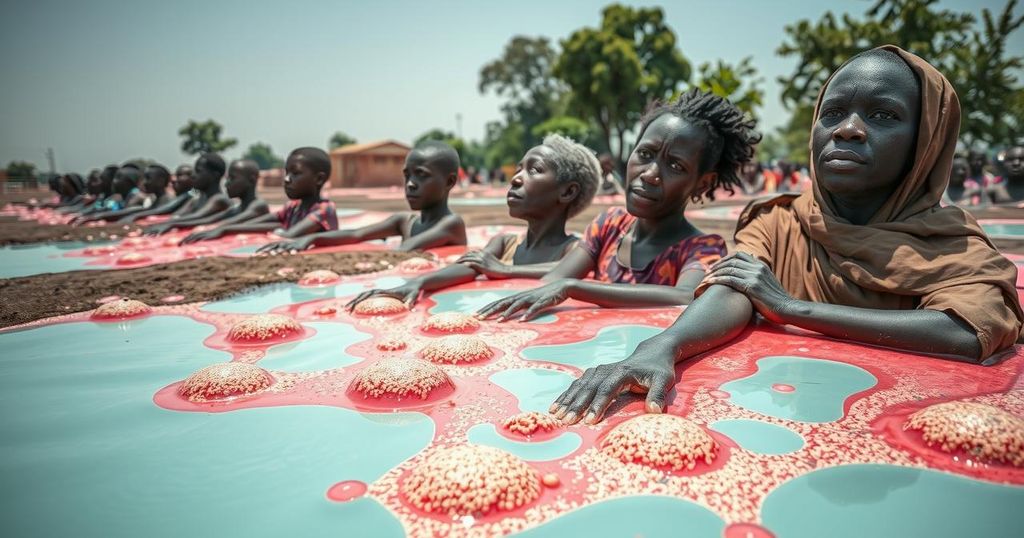Lifestyle
AFRICA, AWEIL, AZ, BAHR EL GHAZAL, DISPLACEMENT, HEALTH, HUMANITARIAN AID, INTERNATIONAL AID, JUBA, LU, LUETH, MICHAEL MAKUEI LUETH, MINISTRY OF HEALTH, NEWS, NEWS. AZ, NORTH AMERICA, NORTHERN BAHR EL GHAZAL, OF HEALTH, REFUGEES, RENK, RENK COUNTY, RUBKONA, RUBKONA COUNTY, SOUTH SUDAN, SOUTH SUDAN MINISTRY OF HEALTH, SUDAN, UN, UNITED STATES, UNITY, UNITY STATE, WHO
Stella Nguyen
0 Comments
Cholera Outbreak in South Sudan Leads to Nearly 60 Deaths Amid Growing Crisis
A cholera outbreak in South Sudan has claimed nearly 60 lives and infected over 6,000 individuals since it began on October 28. The outbreak is particularly severe among internally displaced persons and refugees, prompting vaccination efforts and calls for improved sanitation and hygiene measures to combat the spread of the disease.
A cholera outbreak in South Sudan has resulted in approximately 60 fatalities since its emergence on October 28, as reported by the country’s Minister of Information and Communication, Michael Makuei Lueth. The outbreak has been particularly acute within internally displaced person (IDP) camps situated in Juba, Rubkona County in Unity State, and in refugee camps in the northern regions, especially Renk. Currently, there are around 6,000 reported cases, with government and health organizations mobilizing efforts to manage the crisis.
In response to the escalating situation, vaccination programs have commenced following a report of over 2,184 cholera cases and 31 initial deaths. The South Sudanese Ministry of Health has expressed concerns over the limited vaccine supply, requesting additional doses to effectively address the outbreak. Minister Lueth emphasized preventive measures, urging the public to maintain cleanliness and consume properly cooked food to mitigate the risks associated with cholera infection.
A joint statement by the Ministry of Health and United Nations agencies indicates that the cholera outbreak poses significant risks, particularly to vulnerable populations such as children under five and the elderly. In addition to the health crisis, the situation is compounded by a lack of clean water, poor sanitation conditions, and inadequate hygiene among crowded transit centers and camps. The outbreak was initially linked to a similar epidemic in neighboring Sudan, which has affected over 40,000 individuals. Since April 2023, more than 880,000 refugees have entered South Sudan, many seeking safety through Renk County, prompting the U.N. to offer support in transit and service provisioning.
Cholera is a highly contagious disease that can cause severe dehydration and death if not treated promptly. Its resurgence in South Sudan is alarming, given the country’s ongoing struggles with health infrastructure and sanitation issues. The current outbreak coincides with the influx of refugees fleeing from Sudan amid escalating violence and instability. This has increased the concentration of vulnerable populations in camps that lack adequate resources, further exacerbating the cholera crisis and posing challenges to health authorities in managing such emergencies.
The cholera outbreak in South Sudan is a critical public health challenge that requires urgent attention and action from both local authorities and international health organizations. With nearly 60 reported deaths and thousands infected, the government’s call for additional vaccines and preventive measures is crucial to containing the spread of the disease. As vulnerable populations continue to be impacted, comprehensive support and improved sanitation conditions are essential to effectively combat this public health crisis.
Original Source: news.az




Post Comment